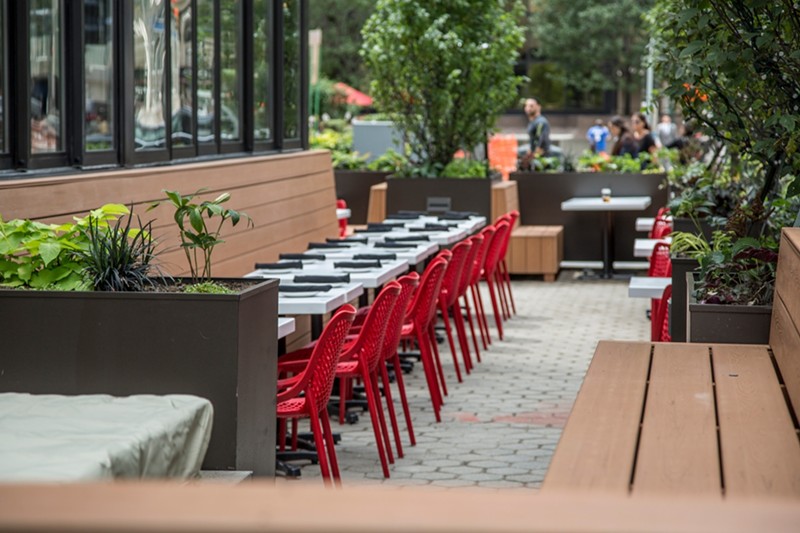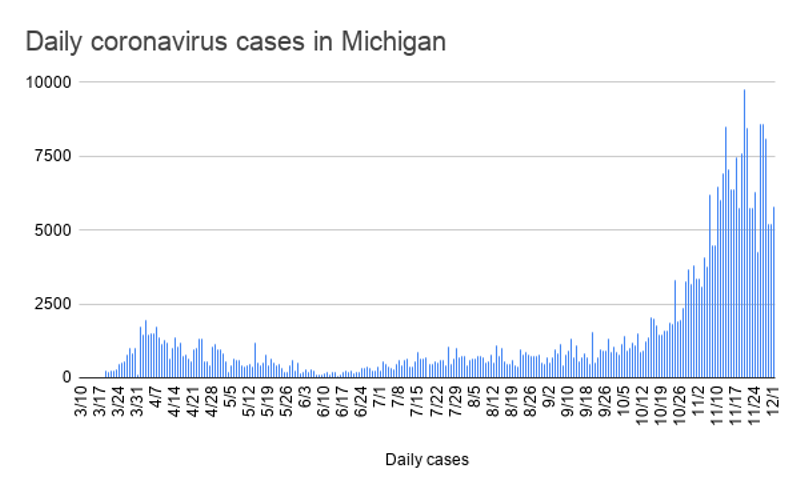
Evan Gonzalez, Detroit Stock City
Heirloom Hospitality Group, which owns the Townhouse restaurants in Detroit and Birmingham, signed onto a lawsuit against MDHHS over its new COVID-19 orders.
A three-week ban on indoor dining at restaurants meant to curb the spread of COVID-19 is still in effect after a judge rejected a lawsuit from Michigan's restaurant association attempting to overturn it.
U.S. District Judge Paul Maloney denied a request from the Michigan Restaurant & Lodging Association on Wednesday, according to the Detroit Free Press. The lawsuit attempted to overturn a three-week pause on indoor dining announced by Gov. Gretchen Whitmer and the Michigan Department of Health and Human Services, which began Nov. 18 and runs through Dec. 8, assuming it doesn't get extended.
But Maloney, a Republican-appointed judge, said "a plausible explanation for the emergency order exists: Restaurant patrons cannot wear a mask while eating or drinking."
The MRLA, which represents more than 5,000 hospitality businesses, partnered with Heirloom Hospitality group — the owner of Detroit's posh Townhouse and Prime + Proper restaurants — for the lawsuit, announced on Nov. 17. The suit sought an emergency preliminary injunction to resume on-premise indoor dining, arguing that the restaurant industry can safely stay open.
Instead of filing a lawsuit, perhaps the MRLA's resources would have been better spent finding other ways to promote restaurants for carry-out. The MRLA did launch a "Thanksgiving to-go" promotion, but it announced it on Tuesday, Nov. 24 — two days before Thanksgiving, when people had likely already made plans. Plus, even if restaurants were allowed to open, it doesn't mean customers will necessarily flock to them as COVID-19 cases surge in the state, dwarfing the past peak in the spring.
The MRLA says that the economic impact of the pandemic could force at least 6,000 Michigan restaurants to permanently close by the spring, and says about 2,000 restaurants have already shuttered.
MRLA president and CEO Justin Winslow issued the following statement following the ruling:
"While we are disappointed with today’s ruling, it is important to note what Judge Maloney explicitly acknowledged in his ruling, stating that 'Michigan restaurants are at risk of, or have already suffered, irreparable harm under Director Gordon’s EO.' It is in that vein that we will now transition our efforts to preventing an extension of the MDHHS Order beyond December 8 and call on Director Gordon to provide clear and specific data to justify the sustained closure of restaurants across the state. Presumptions and generalizations will not suffice and should no longer be tolerated given the significant human toll they have wrought from closing restaurants for a second time this year. Moreover, we believe this industry, like any other that has been forced to close, deserves a clear pathway to the full reintegration of their business, with reliable criteria and metrics to be met from Director Gordon to facilitate that reintegration. We have ideas and reasonable solutions to offer and reiterate our willingness to engage in a substantive dialogue with this administration should they wish to do the same."
However, it's not just Michigan's restaurant industry that's hurting — Michigan's hospitals are nearing capacity.
During a Tuesday press conference, officials said Michigan has about 20% of inpatient beds filled with COVID-19 patients. As of Monday, the state reported 360,449 cases and 9,134 deaths due to COVID-19 since March.
A study from the Centers for Disease Control and Prevention found that adults who developed COVID-19 were "twice as likely" to have dined at a restaurant two weeks before showing symptoms.
Some restaurants have moved to expanding outdoor dining options, which are considered more safe, with tents and "igloos," but experts warn that those aren't completely safe from COVID-19. Some restaurants, like a Big Boy in Michigan's Thumb, have openly defied the ban, incurring fines, while the owner of the Andiamo restaurants has called for other restaurateurs to do the same.
During the press conference, Whitmer came short of saying the ban will be extended, but didn't rule it out.
So many restaurants, so little time. Sign up for our weekly food newsletter delivered every Friday morning for the latest Detroit dining news.


